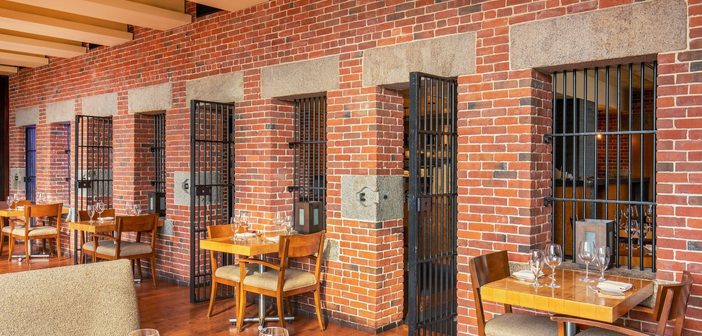Hoteliers reinventing abandoned prisons as luxury properties
By Iain Shaw
Nobody wants to spend a night behind bars, but hoteliers around the world are enticing guests to stay in luxury accommodations created in disused prisons.
Over the past few decades, developers and hoteliers have renovated abandoned jails, giving them new life as high-end hotels.
If it seems counter-intuitive to open a luxury hotel in a building with the negative connotations of a prison, think again. Yes, some “prison” hotels prefer to gloss over the history of the structures that house them. However, the hotels that stand out are those bold enough to embrace their unique past.
The Liberty Hotel in Boston, MA, is an example of a prison that was transformed into a hotel. The Liberty opened in 2007 in the former Charles Street Jail, which was built in 1851 and is listed on the National Register of Historic Landmarks. Famous inmates included Boston Mayor James Michael Curley and civil rights leader Malcolm X.
 The renovations successfully preserved much of the original architecture, including reinventing the jail’s famous 90-foot tall rotunda as The Liberty Hotel’s spectacular lobby. The team even paid tribute to Charles Street Jail architect Gridley James Fox Bryant by incorporating elements of his original design, now more than 150 years old, which had never been fully realized in the jail’s construction.
The renovations successfully preserved much of the original architecture, including reinventing the jail’s famous 90-foot tall rotunda as The Liberty Hotel’s spectacular lobby. The team even paid tribute to Charles Street Jail architect Gridley James Fox Bryant by incorporating elements of his original design, now more than 150 years old, which had never been fully realized in the jail’s construction.
The 298-room Liberty Hotel incorporates playful nods to history. There are restaurants named CLINK (slang for “jail” or “prison”) and Scampo (Italian for “escape”). In The Liberty’s Alibi bar, located on the erstwhile site of the “drunk tank” at Charles Street Jail, real-life celebrity mugshots with tongue-in-cheek “alibis” hang on the walls. Rather than the traditional “Do Not Disturb” signs, guests hang jailer’s keys with tags reading “Solitary” outside rooms to indicate their desire to be left alone.
While guests visiting from afar are usually fascinated by the concept of converting a jail into a luxury hotel, skepticism also is common.
 Former prisons also are popular fodder for ghost stories, and no luxury hotel wants to be viewed as a haunted house. Glenn Sampert, general manager of The Liberty, says that just prior to opening, The Liberty held a blessing ceremony presided over by Buddhist monks. The goal, Sampert says, was “to rid the property of any negative spirits that might still be lurking around from the building’s previous life as the Charles Street Jail.”
Former prisons also are popular fodder for ghost stories, and no luxury hotel wants to be viewed as a haunted house. Glenn Sampert, general manager of The Liberty, says that just prior to opening, The Liberty held a blessing ceremony presided over by Buddhist monks. The goal, Sampert says, was “to rid the property of any negative spirits that might still be lurking around from the building’s previous life as the Charles Street Jail.”
By engaging their surrounding communities, hoteliers can transform these places with dark, painful associations into sources of local pride. By combining their business acumen with their creative talents, innovative hoteliers can create unique properties that are impossible to forget.




